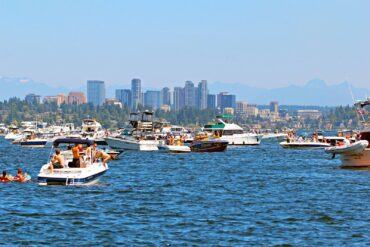 The spectacular vistas, lush forests and scenic waterways are all around us on the West Sound. We are, indeed, fortunate to live in such a beautiful place and we also have incredible outdoor recreational opportunities including boating. If you are heading out to enjoy Puget Sound waterways or on one of our many lakes, there are five things you should know before your go.
The spectacular vistas, lush forests and scenic waterways are all around us on the West Sound. We are, indeed, fortunate to live in such a beautiful place and we also have incredible outdoor recreational opportunities including boating. If you are heading out to enjoy Puget Sound waterways or on one of our many lakes, there are five things you should know before your go.
1. Know the rules.
The State of Washington requires you to have a boater education card if you are going to operate a vessel with a 15-horsepower (or greater) motor, unless you were born before Jan. 1, 1955. To obtain a boater education card, you must take (and pass) a state-approved boating safety course or pass an equivalency exam.
Even if you aren’t required to have this card, it’s a good idea to get one so you know the laws and rules of safe boating. You may find out more about getting your card at the Washington State Parks Boating Program website.
2. Know where you are going.
Different waterways could have different safety concerns. In Gig Harbor, Police Chief Kelly Busey says the harbor has its own unique challenges.
“We have a unique and well protected harbor that is very popular,” he says. “It’s popular with paddle boarders and large vessels, which equals a lot of congestion around the harbor.”
To make sure safety in the harbor is a priority, Gig Harbor Police Department has a “Go With the Flow” safety program — check out the video on this page to learn more. For overall safety, Chief Busey sums it up well by advising, “Wear your lifejacket, get a boater education card and understand the limitations of your vessel.”
3. Know the conditions.
Understanding the marine forecast is critical to safe boating. It is important to understand how the weather affects waves, tides and even radio activity. Sudden changes in weather conditions can create life-threatening situations.
According to NOAA, typical marine forecasts go far beyond the weather. They include information on wind speed, wave conditions, water roughness and tides.
4. Know to tell someone where you are going.
This is good advice to follow before you embark on any adventure. Take it a step further — don’t just tell someone you are going boating, tell them where you are going and when you plan to be back.
If you are involved in an accident or other emergency, time is critical and it’s much better for your friend to tell authorities, “Joe was going paddle-boarding at the Gig Harbor Marina and he was supposed to be back by 6 p.m.” Versus, “Joe just said he was heading to the marina for a while.” It’s much quicker to send help if your helpers know where to go.
5. Know where to get and how to use an emergency beacon.
An emergency locator beacon mounted on your vessel could quite literally be a lifesaver. If you have an emergency on the water and cannot get cell service, an emergency position-indicating radio beacon (EPIRB) connects with satellites and sends an emergency distress signal to search-and-rescue resources via the 406 MHz frequency.
There are also personal locator beacons (PLB) that operate the same way. A PLB is also a fantastic option if you are heading out for a hike. You can find more information on this important program from the National Safe Boating Council. If you are only heading out for a short trip or funds are tight, there are also several places that rent both EPIRBs and PLBs.
Stay safe, everyone, and happy boating.























Comments